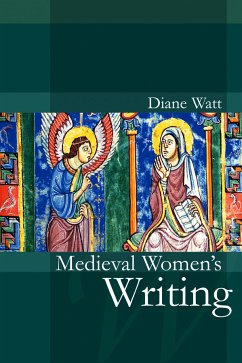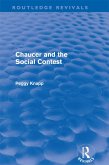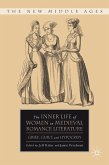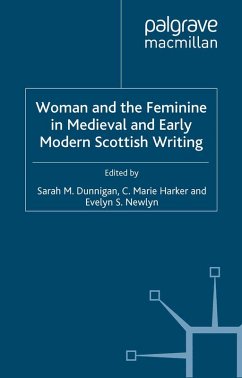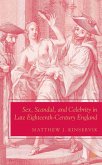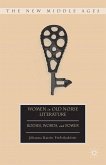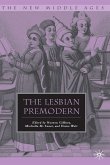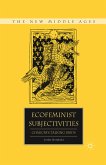Medieval Women's Writing is a major new contribution to our understanding of women's writing in England, 1100-1500.
The most comprehensive account to date, it includes writings in Latin and French as well as English, and works for as well as by women. Marie de France, Clemence of Barking, Julian of Norwich, Margery Kempe, and the Paston women are discussed alongside the Old English lives of women saints, The Life of Christina of Markyate, the St Albans Psalter, and the legends of women saints by Osbern Bokenham.
Medieval Women's Writing addresses these key questions:
Diane Watt argues that female patrons, audiences, readers, and even subjects contributed to the production of texts and their meanings, whether written by men or women. Only an understanding of textual production as collaborative enables us to grasp fully women's engagement with literary culture. This radical rethinking of early womens literary history has major implications for all scholars working on medieval literature, on ideas of authorship, and on women's writing in later periods. The book will become standard reading for all students of these debates.
Hinweis: Dieser Artikel kann nur an eine deutsche Lieferadresse ausgeliefert werden.
The most comprehensive account to date, it includes writings in Latin and French as well as English, and works for as well as by women. Marie de France, Clemence of Barking, Julian of Norwich, Margery Kempe, and the Paston women are discussed alongside the Old English lives of women saints, The Life of Christina of Markyate, the St Albans Psalter, and the legends of women saints by Osbern Bokenham.
Medieval Women's Writing addresses these key questions:
- Who were the first women authors in the English canon?
- What do we mean by women's writing in the Middle Ages?
- What do we mean by authorship?
- How can studying medieval writing contribute to our understanding of women's literary history?
Diane Watt argues that female patrons, audiences, readers, and even subjects contributed to the production of texts and their meanings, whether written by men or women. Only an understanding of textual production as collaborative enables us to grasp fully women's engagement with literary culture. This radical rethinking of early womens literary history has major implications for all scholars working on medieval literature, on ideas of authorship, and on women's writing in later periods. The book will become standard reading for all students of these debates.
Dieser Download kann aus rechtlichen Gründen nur mit Rechnungsadresse in D ausgeliefert werden.
Hinweis: Dieser Artikel kann nur an eine deutsche Lieferadresse ausgeliefert werden.
"A scholarly, sensitive and thoughtful account that will beinvaluable to anyone studying the literary history of the period,from undergraduate level onwards."
BBC History Magazine
"A careful and intelligent selection of some of the better-knownworks either by, for or on behalf of women ... This [is a] highlyinformed, well-researched, non-esoteric and thoroughly accessiblevolume."
Times Higher Education Supplement
"Essential reading for student and academic alike."
Medium Aevum
"By combining a theoretically informed, inclusive theory oftextuality with persuasive readings of well-known and less-familiartexts, Watt's study offers a valuable contribution to teaching andscholarship alike."
Speculum
"A rich study in literary sociology. The value of Watt's book isto demonstrate not only that, but how, some medieval texts invarious genres have been negotiated and mediated."
Journal of English and Germanic Philology
"The book blends two philosophiesthat one might thinkirreconcilable. First, the book is directed squarely (although notexclusively) at university students. Second, the book includes thekind of close and original readings of texts that a scholar mightnormally reserve for a journal article or monograph. The fact thatWatt has blended these two seemingly separate activities iswonderful to see - why shouldn't students be given the respect ofhaving new and original research directed straight at them?"
Medieval Feminist Forum
"Each chapter would be of interest to scholars of women inmedieval England, in particular those who work on Christina ofMarkyate, Marie de France, legends and lives of women saints,Julian of Norwich, Margery Kempe and the Paston letters. Watt'sfine volume concludes with an extremely useful bibliography andlist of suggested readings."
The Year's Work in English Studies
"A useful addition not only to the work on medieval womenwriters in particular, but to the history of women's writing ingeneral, making ever more apparent those foremothers whose absenceVirginia Woolf lamented."
Feminist Theory
"I am delighted by the appearance of this book. Lucidly writtenfor a general audience, Medieval Women's Writing is by farthe most interesting, balanced, and up-to-date study now in print.But it is more than this: it is also a collection of originalreadings of major women writers, which has new and often powerfulthings to say about how we think about women's writing in thepremodern period, and about what it means to describe this writingas a 'women's literary tradition'. Flexible, passionate, ethicallyengaged, Medieval Women's Writing will be a valuable andmuch-discussed resource for scholars, teachers, students, as wellas general readers."
Nicholas Watson, Harvard University
"Innovative, informative and accessible, this book is afundamental re-assessment of medieval women's writing. Watt's workengages with women as writers and readers, as participants andcollaborators and, above all, as agents who shape medieval textualproduction and reception. This is a book on women that is notafraid to consider the early medieval period together with thelater Middle Ages. At last!"
Clare A. Lees, King's College London
"A useful, insightful, and bang up-to-date introduction tomedieval women's writing in England by a critic especiallysensitive to collaborative aspects of textual production.Recommended!"
David Wallace, University of Pennsylvania
BBC History Magazine
"A careful and intelligent selection of some of the better-knownworks either by, for or on behalf of women ... This [is a] highlyinformed, well-researched, non-esoteric and thoroughly accessiblevolume."
Times Higher Education Supplement
"Essential reading for student and academic alike."
Medium Aevum
"By combining a theoretically informed, inclusive theory oftextuality with persuasive readings of well-known and less-familiartexts, Watt's study offers a valuable contribution to teaching andscholarship alike."
Speculum
"A rich study in literary sociology. The value of Watt's book isto demonstrate not only that, but how, some medieval texts invarious genres have been negotiated and mediated."
Journal of English and Germanic Philology
"The book blends two philosophiesthat one might thinkirreconcilable. First, the book is directed squarely (although notexclusively) at university students. Second, the book includes thekind of close and original readings of texts that a scholar mightnormally reserve for a journal article or monograph. The fact thatWatt has blended these two seemingly separate activities iswonderful to see - why shouldn't students be given the respect ofhaving new and original research directed straight at them?"
Medieval Feminist Forum
"Each chapter would be of interest to scholars of women inmedieval England, in particular those who work on Christina ofMarkyate, Marie de France, legends and lives of women saints,Julian of Norwich, Margery Kempe and the Paston letters. Watt'sfine volume concludes with an extremely useful bibliography andlist of suggested readings."
The Year's Work in English Studies
"A useful addition not only to the work on medieval womenwriters in particular, but to the history of women's writing ingeneral, making ever more apparent those foremothers whose absenceVirginia Woolf lamented."
Feminist Theory
"I am delighted by the appearance of this book. Lucidly writtenfor a general audience, Medieval Women's Writing is by farthe most interesting, balanced, and up-to-date study now in print.But it is more than this: it is also a collection of originalreadings of major women writers, which has new and often powerfulthings to say about how we think about women's writing in thepremodern period, and about what it means to describe this writingas a 'women's literary tradition'. Flexible, passionate, ethicallyengaged, Medieval Women's Writing will be a valuable andmuch-discussed resource for scholars, teachers, students, as wellas general readers."
Nicholas Watson, Harvard University
"Innovative, informative and accessible, this book is afundamental re-assessment of medieval women's writing. Watt's workengages with women as writers and readers, as participants andcollaborators and, above all, as agents who shape medieval textualproduction and reception. This is a book on women that is notafraid to consider the early medieval period together with thelater Middle Ages. At last!"
Clare A. Lees, King's College London
"A useful, insightful, and bang up-to-date introduction tomedieval women's writing in England by a critic especiallysensitive to collaborative aspects of textual production.Recommended!"
David Wallace, University of Pennsylvania

